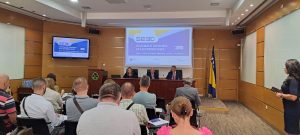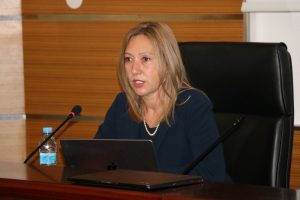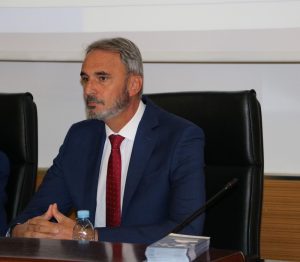Sarajevo – As part of the CEFTA SEED+ project (Systems for Electronic Data Exchange), and in cooperation with the Foreign Trade Chamber of BiH, the Chamber Investment Forum of the Western Balkans and the Veterinary Office of BiH, the first training of veterinary inspectors and the company related to issuing veterinary certificates in SEED+/CEFTA TRACES NT (Trade Control and Expert System New Technology) software was held on Monday in Sarajevo.
 The aim of the training is to equip participants with the comprehensive knowledge and practical skills required to skillfully use the SEED+ platform to facilitate trade in animals and animal products while ensuring compliance with veterinary health and safety standards.
The aim of the training is to equip participants with the comprehensive knowledge and practical skills required to skillfully use the SEED+ platform to facilitate trade in animals and animal products while ensuring compliance with veterinary health and safety standards.
The training includes an in-depth understanding of the functionality of the software, covering aspects such as registration of shipments, management of certificate templates, entry of relevant data, installation of necessary documentation and submission of requests for health certificates. The wider scope of the training includes improving the ability of participants to accurately assess the health status of animals or animal products intended for export or import, thereby contributing to the prevention of disease transmission and promoting food safety.
 “I am very pleased that our economic operators will finally feel the positive effects of digitization in this area. “CEFTA TRACES NT, enabling the accurate and timely exchange of veterinary certificates, effectively helps in risk assessment and management, ensuring a safer trade environment, mitigates obstacles, reduces costs and accelerates the movement of goods throughout CEFTA,” said Edna Karadža, SEED+ project manager.
“I am very pleased that our economic operators will finally feel the positive effects of digitization in this area. “CEFTA TRACES NT, enabling the accurate and timely exchange of veterinary certificates, effectively helps in risk assessment and management, ensuring a safer trade environment, mitigates obstacles, reduces costs and accelerates the movement of goods throughout CEFTA,” said Edna Karadža, SEED+ project manager.
Saša Bošković, director of the BiH Veterinary Office, pointed out that this is the first in a series of trainings for veterinary workers and operators in business entities, related to innovations in shipment certification.
 “We, together with the competent bodies, that is, the entity ministries of agriculture, have initiated certain procedures related to the digitalization of the certification of shipments. This is important for future procedures because we will enter the digitization of certificates, we will simplify the procedures and we will enable businessmen to have the necessary documentation faster,” said Bošković.
“We, together with the competent bodies, that is, the entity ministries of agriculture, have initiated certain procedures related to the digitalization of the certification of shipments. This is important for future procedures because we will enter the digitization of certificates, we will simplify the procedures and we will enable businessmen to have the necessary documentation faster,” said Bošković.
As Bošković said, businessmen have been looking for this type of digitization for a long time, and as part of this project, 140 inspectors and representatives of companies in Sarajevo and Banja Luka will undergo training this week.

“This program is important for the improvement of foreign trade exchange. CEFTA is an important trade area for us, but there is still room for this cooperation to develop and improve so that we can all be more represented in other markets. Digitization will help us speed up the flow of goods and improve export results,” said Zdravko Marinković, president of the Foreign Trade Chamber of Bosnia and Herzegovina.
By the end of the training, participants should have the expertise to effectively navigate the SEED+/CEFTA TRACES, ensuring simplified trade procedures, safeguarding animal and public health and strengthening their role as participants in regional trade.

